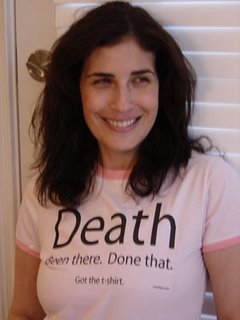The Nurture Assumption
In her 1998 book,The Nurture Assumption: Why Children Turn Out the Way They Do, author Judith Rich Harris discussed how parents played a smaller role than originally thought in how their children turn out. She postulates that genes and peers are the most important influences on kid's lives and as a psychologist, I have to say that from what I have seen, this can sometimes be true. Have you ever wondered how you can have one kid who is so calm and good-natured and another who is hell on wheels? Well, you're not alone.
author Judith Rich Harris discussed how parents played a smaller role than originally thought in how their children turn out. She postulates that genes and peers are the most important influences on kid's lives and as a psychologist, I have to say that from what I have seen, this can sometimes be true. Have you ever wondered how you can have one kid who is so calm and good-natured and another who is hell on wheels? Well, you're not alone.
Many of the parents of my young patients spend years wondering what went wrong with the child they loved and nurtured who later turned out to be a vandal, cheat, scoundrel, or worse. They rack their brains trying to find the lack of love or nurturance on their part that led to their little darling ending up in legal trouble. I sometimes have to just say, "You know, it's not your fault." I think that if parents would read the Nurture Assumption, they might understand more about how heredity and the peers one picks play a heavy role in how the kids turn out and quit blaming themselves so much. It would be time better spent trying to surround a child with peers who are good role models.
Now Ms. Harris has another book that comes out next week, No Two Alike: Human Nature and Human Individuality, in which she tackles the question, "Why do twins who grow up together have different personalities?" They have the same genes, same parents, so what makes them different? The book description at Amazon sounds fascinating:
in which she tackles the question, "Why do twins who grow up together have different personalities?" They have the same genes, same parents, so what makes them different? The book description at Amazon sounds fascinating:
Here is a question and answer session with Ms. Harris at Gene Expression. I can't wait to read her book and find out more.
Many of the parents of my young patients spend years wondering what went wrong with the child they loved and nurtured who later turned out to be a vandal, cheat, scoundrel, or worse. They rack their brains trying to find the lack of love or nurturance on their part that led to their little darling ending up in legal trouble. I sometimes have to just say, "You know, it's not your fault." I think that if parents would read the Nurture Assumption, they might understand more about how heredity and the peers one picks play a heavy role in how the kids turn out and quit blaming themselves so much. It would be time better spent trying to surround a child with peers who are good role models.
Now Ms. Harris has another book that comes out next week, No Two Alike: Human Nature and Human Individuality,
Her solution is a startlingly original one: the first completely new theory of personality since Freud's. Based on a principle of evolutionary psychology—the idea that the human mind is a toolbox of special-purpose devices—Harris's theory explains how attributes we all have in common can make us different.
This is the story of a scientific quest, but it is also the personal story of a courageous and innovative woman who refused to be satisfied with "what everyone knows is true."
Here is a question and answer session with Ms. Harris at Gene Expression. I can't wait to read her book and find out more.



